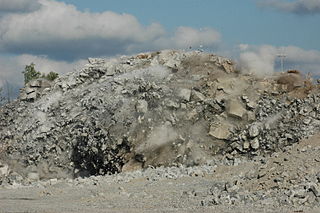Contents
Boring may refer to:
- Something that causes boredom
Boring may refer to:
A hole is a hollow place, an opening in/through a solid body, or an excavation in the ground.

In conventional usage, boredom, ennui, or tedium is an emotion characterized by uninterest in one's surrounding, often caused by a lack of distractions or occupations. Although, "There is no universally accepted definition of boredom. But whatever it is, researchers argue, it is not simply another name for depression or apathy. It seems to be a specific mental state that people find unpleasant—a lack of stimulation that leaves them craving relief, with a host of behavioral, medical and social consequences." According to BBC News, boredom "...can be a dangerous and disruptive state of mind that damages your health"; yet research "...suggest[s] that without boredom we couldn't achieve our creative feats."

A tunnel boring machine (TBM), also known as a "mole" or a "worm", is a machine used to excavate tunnels. Tunnels are excavated through hard rock, wet or dry soil, or sand, each of which requires specialized technology.
Bore or Bores often refer to:

Howard Robard Hughes Sr. was an American businessman and inventor who founded the Hughes Tool Company. He invented the "Sharp–Hughes" two-cone rotary drill bit during the Texas Oil Boom. Hughes was the father and namesake of Howard Hughes the American business tycoon and founder of Hughes Aircraft.

A jackhammer is a pneumatic or electro-mechanical tool that combines a hammer directly with a chisel. It was invented by William McReavy, who then sold the patent to Charles Brady King. Hand-held jackhammers are generally powered by compressed air, but some are also powered by electric motors. Larger jackhammers, such as rig-mounted hammers used on construction machinery, are usually hydraulically powered. These tools are typically used to break up rock, pavement, and concrete.
Borer may refer to:
A drill is a tool or machine for cutting holes in a material.

A drilling rig is an integrated system that drills wells, such as oil or water wells, or holes for piling and other construction purposes, into the earth's subsurface. Drilling rigs can be massive structures housing equipment used to drill water wells, oil wells, or natural gas extraction wells, or they can be small enough to be moved manually by one person and such are called augers. Drilling rigs can sample subsurface mineral deposits, test rock, soil and groundwater physical properties, and also can be used to install sub-surface fabrications, such as underground utilities, instrumentation, tunnels or wells. Drilling rigs can be mobile equipment mounted on trucks, tracks or trailers, or more permanent land or marine-based structures. The term "rig" therefore generally refers to the complex equipment that is used to penetrate the surface of the Earth's crust.

Drilling and blasting is the controlled use of explosives and other methods, such as gas pressure blasting pyrotechnics, to break rock for excavation. It is practiced most often in mining, quarrying and civil engineering such as dam, tunnel or road construction. The result of rock blasting is often known as a rock cut.
A well is an artificial excavation, hole or structure for the purpose of withdrawing an underground resource, usually water
The Beaconsfield gold mine collapsed on 25 April 2006 in Beaconsfield, Tasmania, Australia. Of the seventeen people who were in the mine at the time, fourteen escaped immediately following the collapse, one miner was killed, while the remaining two were found alive on the sixth day by miners Pat Ball and Steve Saltmarsh. Webb and Russell were rescued on 9 May 2006, two weeks after being trapped nearly 1 kilometre (0.62 mi) below the surface.
Boring machine may refer to:

The Crandall Canyon Mine, formerly Genwal Mine, was an underground bituminous coal mine in northwestern Emery County, Utah.
Bored refers to a state of boredom.

Herrenknecht AG is a German company that manufactures tunnel boring machines (TBMs). Headquartered in Allmannsweier, Schwanau, Baden-Württemberg, it is the worldwide market leader for heavy TBMs.

Boring is drilling a hole, tunnel, or well in the Earth. It is used for various applications in geology, agriculture, hydrology, civil engineering, and mineral exploration. Today, most Earth drilling serves one of the following purposes:
Drilling is the cutting of a hole into a solid.
Auger may refer to:
Boredom, tedium, ennui, is an emotional or psychological state of mind.